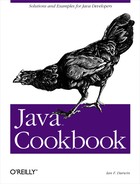The Unix folk have had to deal with this longer than anybody, and
they came up with a C-library function called
getopt. [10]
getopt processes your command-line arguments and
looks for single-character options set off with dashes and optional
arguments. For example, the command:
sort -n -o outfile myfile1 yourfile2
runs the standard sort program. The
-n tells it that the records are numeric rather
than textual, and the -o
outfile tells it to write its output into a file
named outfile. The remaining words,
myfile1 and yourfile2, are
treated as the input files to be sorted. On a Microsoft-based
platform such as Windows 95, command arguments are set of with
slashes ( / ). We will use the Unix form -- a dash -- in our
API, but feel free to change the code to use slashes.
As in C, the getopt( ) method is used in a
while loop. It returns once for each valid option
found, returning the value of the character that was found or zero
when all options (if any) have been processed.
Here is a program that uses my GetOpt
class just to see if there is a
-h (for help) argument on the command line:
import com.darwinsys.util.GetOpt;
/** Trivial demonstration of GetOpt. If -h present, print help.
*/
public class GetOptSimple {
public static void main(String[] args) {
GetOpt go = new GetOpt("h");
char c;
while ((c = go.getopt(args)) != 0) {
switch(c) {
case 'h':
helpAndExit(0);
break;
default:
System.err.println("Unknown option in " +
args[go.getOptInd( )-1]);
helpAndExit(1);
}
}
System.out.println( );
}
/** Stub for providing help on usage
* You can write a longer help than this, certainly.
*/
static void helpAndExit(int returnValue) {
System.err.println("This would tell you how to use this program");
System.exit(returnValue);
}
}The following longer demo program has several options:
import com.darwinsys.util.GetOpt;
/** Simple demonstration of GetOpt. Accept the '-n' and '-o outfile'
* options as shown for sort, and also -h for help.
*/
public class GetOptDemo {
public static void main(String[] args) {
GetOpt go = new GetOpt("hno:");
boolean numeric_option = false;
String outFileName = "(standard output)";
char c;
while ((c = go.getopt(args)) != GetOpt.DONE) {
switch(c) {
case 'h':
doHelp(0);
break;
case 'n':
numeric_option = true;
break;
case 'o':
outFileName = go.optarg( );
break;
default:
System.err.println("Unknown option character " + c);
doHelp(1);
}
}
System.out.print("Options: ");
System.out.print("Numeric: " + numeric_option + ' '),
System.out.print("Output: " + outFileName + "; ");
System.out.println("Inputs: ");
if (go.getOptInd( )-1 == args.length) {
doFile("(standard input)");
} else for (int i=go.getOptInd( )-1; i<args.length; i++)
doFile(args[i]);
}
/** Stub for providing help on usage
* You can write a longer help than this, certainly.
*/
static void doHelp(int returnValue) {
System.err.println("Usage: GetOptDemo [-h][-n][-o outfile] file ...");
System.exit(returnValue);
}
/** Stub to demonstrate processine one file. */
static void doFile(String fileName) {
System.out.println(fileName + ' '),
}
}If we invoke it several times with different options, here’s how it behaves:
C:javasrcenviron>java GetOptDemo Options: Numeric: false Output: (standard output) ; Input: (standard input) C:javasrcenviron>java GetOptDemo -h Usage: GetOptDemo [-h][-n][-o outfile] file ... C:javasrcenviron>java GetOptDemo -n a b c Options: Numeric: true Output: (standard output) ; Input: b c C:javasrcenviron>java GetOptDemo -n -o resultfile file1 file2 Options: Numeric: true Output: resultfile ; Input: file2
Here is a longer example using GetOpt:
public class GetOptTest {
public static void main(String argv[]) {
String goodArgChars = "o:h", goodArgs[] = {
"-h", "-o", "outfile", "infile"
};
String badArgChars = "f1o", badArgs[] = {
"-h", "-o", "outfile", "infile"
};
process(goodArgChars, goodArgs);
process(badArgChars, goodArgs);
process(badArgChars, badArgs);
}
/** Private function, for testing. */
private static void process(String argChars, String[] args) {
System.out.println("** START ** " + argChars + '(' + args.length + ')'),
GetOpt go = new GetOpt(argChars);
char c;
while ((c = go.getopt(args)) != 0) {
System.out.print("Found " + c);
if (go.optarg( ) != null)
System.out.print("; Option " + go.optarg( ));
System.out.println( );
}
for (int i=go.optind( ); i<args.length; i++)
System.out.println("Filename-like arg " + args[i]);
}
}This program (which I used to
test the GetOpt class
while I was writing it) demonstrates several uses of
getopt, some successful and some (by design)
unsuccessful. It prints the successes and failures as it goes:
$ java GetOptTest ** START ** o:h(4) Found h Found o; Option outfile ** START ** f1o(4) Bad option Found o Filename-like arg infile At least one user error found ** START ** f1o(4) Bad option Found o Filename-like arg infile At least one user error found $
GetOpt is an adequate tool for processing
command-line options. You may come up with something better and
contribute it to the Java
world; this is left
as an exercise for the
reader.
[10] There are several variations on getopt in the Unix world; my version emulates fairly closely the original AT&T standard one. The newer ones offer more frills such as long-name arguments, but the basic operation is pretty similar.
